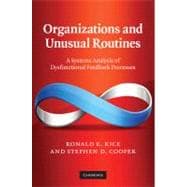
Note: Supplemental materials are not guaranteed with Rental or Used book purchases.
Purchase Benefits
Looking to rent a book? Rent Organizations and Unusual Routines: A Systems Analysis of Dysfunctional Feedback Processes [ISBN: 9780521768641] for the semester, quarter, and short term or search our site for other textbooks by Ronald E. Rice , Stephen D. Cooper. Renting a textbook can save you up to 90% from the cost of buying.
| List of figures | p. viii |
| List of tables | p. ix |
| List of boxes | p. x |
| Preface | p. xi |
| Acknowledgments | p. xiv |
| Crazy systems, Kafka circuits, and unusual routines | p. 1 |
| Two stories of mundane complexity and dysfunctional feedback | p. 1 |
| Crazy systems | p. 5 |
| Unusual routines | p. 17 |
| The rest of the book | p. 19 |
| Causes, symptoms, and subroutines of unusual routines in six computer information/communication systems | p. 21 |
| Causes of unusual routines in three ICTs | p. 22 |
| Causes, symptoms, and subroutines of unusual routines in three ICTs | p. 40 |
| Conclusion | p. 60 |
| Getting personal: unusual routines at the customer service interface | p. 67 |
| Customer service, dissatisfaction, and complaining | p. 68 |
| Examples and analysis of unusual service subroutines, routines, and organizational (non-)response | p. 81 |
| Conclusion | p. 106 |
| A multi-theoretical foundation for understanding unusual routines | p. 107 |
| Five foundational theories for a preliminary model of unusual routines | p. 107 |
| Developing a preliminary model of unusual routines | p. 139 |
| Five propositions | p. 149 |
| Conclusion | p. 152 |
| A detailed case study of unusual routines | p. 155 |
| Method | p. 155 |
| Proposition 1 | p. 160 |
| Proposition 2 | p. 167 |
| Proposition 3 | p. 173 |
| Proposition 4 | p. 177 |
| Proposition 5 | p. 191 |
| Conclusion | p. 199 |
| Summary and discussion of the case study results | p. 200 |
| Proposition 1 | p. 200 |
| Proposition 2 | p. 201 |
| Proposition 3 | p. 201 |
| Proposition 4 | p. 202 |
| Proposition 5 | p. 203 |
| Discussion | p. 204 |
| Conclusion | p. 215 |
| Individual and organizational challenges to feedback | p. 217 |
| Feedback challenges inherent in human communication behaviors | p. 218 |
| Feedback challenges inherent in organizations | p. 227 |
| Conclusion | p. 249 |
| A multi-level and cross-disciplinary summary of concepts related to unusual routines | p. 252 |
| Cognitive and social processing errors | p. 252 |
| Social traps and dilemmas | p. 266 |
| Organizational complexity | p. 269 |
| Organizational paradoxes | p. 274 |
| Organizational deviance | p. 280 |
| Technological complexity | p. 287 |
| Conclusion | p. 305 |
| Recommendations for resolving and mitigating unusual routines and related phenomena | p. 306 |
| Encourage customer service feedback from all stakeholders | p. 306 |
| Apply socio-technical systems theory, involve stakeholders from design through walkarounds | p. 310 |
| Reduce blaming and defensive approaches to cognitive dissonance | p. 312 |
| Manage paradoxes and sensemaking | p. 314 |
| Foster learning through feedback | p. 317 |
| Heighten awareness of predictable surprises and avoid overreacting to worst-case scenarios | p. 319 |
| Understand and resolve social traps and social dilemmas | p. 320 |
| Discuss and resolve conflicting goals, vicious cycles, and workplace deviance | p. 321 |
| Avoid simple and individual approaches to complex technology and system error | p. 322 |
| Apply and combine linkage and routines analysis | p. 325 |
| Conclusion | p. 329 |
| Summary and a tentative integrated model of unusual routines | p. 331 |
| The allure of unusual routines | p. 331 |
| Our preliminary models | p. 333 |
| A proposed integrative model of unusual routines | p. 336 |
| Conclusion | p. 342 |
| References | p. 344 |
| Index | p. 373 |
| Table of Contents provided by Ingram. All Rights Reserved. |
The New copy of this book will include any supplemental materials advertised. Please check the title of the book to determine if it should include any access cards, study guides, lab manuals, CDs, etc.
The Used, Rental and eBook copies of this book are not guaranteed to include any supplemental materials. Typically, only the book itself is included. This is true even if the title states it includes any access cards, study guides, lab manuals, CDs, etc.